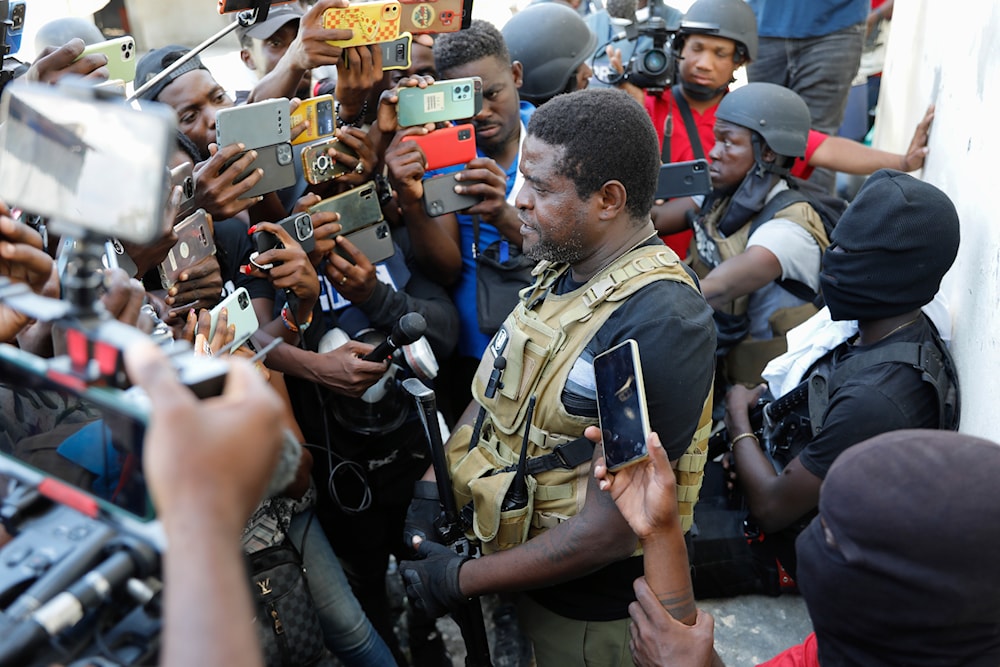Haitian gang leader warns of 'genocide' if Henry remains in power
After orchestrating prison breaks and leading an attack on a police station, Barbecue vows to oust Prime Minister Henry.
-

Jimmy Cherizier, also known as "Barbecue", the leader of the "G9 Family and Allies" criminal federation, speaks to journalists in the Delmas 6 neighborhood of Port-au-Prince in Port-au-Prince, Haiti, March 5, 2024. (AP)
A prominent leader of a Haitian gang issued a stark warning on Tuesday, asserting that the escalating turmoil in the capital, Port-au-Prince, could lead to civil war and "genocide" unless Prime Minister Ariel Henry steps down.
Jimmy Cherizier, also known as "Barbecue", delivered these remarks as Prime Minister Henry faced difficulties returning home, as the country's main airport came under attack by mobs and following a refusal of landing permission from the neighboring Dominican Republic.
Gunfire disrupted flights at Toussaint Louverture International Airport in Port-au-Prince. Reports indicate that Henry was denied entry into the Dominican Republic, but his plane briefly landed in nearby Puerto Rico, according to a spokesperson for the governor's office.
Henry, who was expected to step down last month, found himself confronted by armed criminal gangs orchestrating a coordinated assault to remove him while he was out of the country.
Cherizier, a former police officer under UN sanctions for human rights violations, addressed reporters, stating, "If Ariel Henry doesn't resign, if the international community continues to support him, we'll be heading straight for a civil war that will lead to genocide." He emphasized the need for Haiti's fate to be determined by its people rather than a privileged few.
"Either Haiti becomes a paradise or a hell for all of us. It's out of the question for a small group of rich people living in big hotels to decide the fate of people living in working-class neighborhoods," Cherizier said.
Cherizier leads the "G9 Family and Allies" criminal federation, which includes nine Haitian gangs that hold a strong presence in the capital. The G9 alliance directly with the G-Pep criminal organization, as both organizations hold close ties to Haitian officials and businessmen.
On the other hand, Henry has been in power since the 2021 assassination of President Jovenel Moise, when he agreed to a power-sharing deal with the opposition, delaying his resignation until new elections could be organized. Recently, Henry traveled to Kenya to further his attempts for the deployment of a United Nations Police Force in Haiti.
Earlier on Tuesday, an armed gang attacked a police academy in the capital, which houses over 800 cadets. The assault was repelled with reinforcements, according to Lionel Lazarre of the Haitian police union. They had also raided two prisons in Port-au-Prince, resulting in deaths and the escape of an estimated 4,000 inmates.
Port-au-Prince, after being virtually paralyzed, showed signs of subdued activity on Tuesday, with some transport resuming and businesses reopening amid long queues. The government has declared a state of emergency and a nighttime curfew, while the UN Security Council has scheduled a closed-door meeting in response to the crisis.
US not to send troops despite not being asked to
In response to the ongoing events, the United States said it would not send troops to Haiti.
On Monday night, nearly five days after powerful organized crime bosses launched a wave of deadly and apparently coordinated attacks, McClatchy reported there had been “frantic” exchanges between US and Haitian diplomats that had raised the prospect of an emergency deployment of US special forces to help restore order.
However, a National Security Council official poured cold water on the suggestion there would be US “boots on the ground” in Haiti, telling the Washington-based agency, “The United States is not sending US troops to Haiti to support the Haitian national police’s security operations.”
Read more: Haiti announces state of emergency following mass prison break

 4 Min Read
4 Min Read








